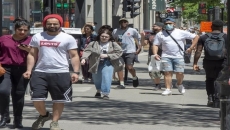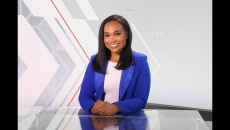Parents, students and teachers anxious about the coming school year received an outline Wednesday about British Columbia's plans for a safe return to full-time classes during the COVID-19 pandemic.
Education Minister Rob Fleming said most students from kindergarten to Grade 12 will return to B.C. schools starting Sept. 8.
Enhanced safety measures and more resources to prevent the spread of COVID-19 will allow the province to move ahead with school restart plans, he said.
"We are maximizing the number of students who are returning to class," Fleming said at a news conference. "We had 200,000 students attend school in June and that has given us some important information. We do know there's no substitute for in-class learning."
He said classes are essential to the mental and academic development of students and the plan will support and ensure their health and safety.
The plan was developed with a committee of teachers, parents, First Nations, principals, trustees, school boards, support workers and health and safety officials. It builds on the experiences from June when students had the option of attending part time, Fleming said.
On the advice of provincial health officer Dr. Bonnie Henry, students will be organized into learning groups to reduce the number of people they come in contact with, cutting the risk of transmitting the novel coronavirus, he said.
Henry said the groups for elementary and middle-school students will be no greater than 60 people and the secondary school groups will be up to 120 people.
"Looking to September, school is going to look and feel different," she said. "We know schools can safely reopen if community transmission is low."
But the union representing teachers said the plan is not ready and needs more work.
"The reopening needs to be safe, careful, and get the buy-in of teachers, support staff, parents, and students," Teri Mooring, BC Teachers' Federation president, said in a statement. "Bringing everyone back all at once, even with some version of a cohort model, on the first day after the Labour Day long weekend, is too much, too soon given the many unanswered questions in (Wednesday's) announcement."
Henry said the learning groups will limit the potential for COVID-19 transmission and make contact tracing easier. She said if transmissions occur within schools the plan will have to be flexible and adjustments made.
Fleming told the legislature Tuesday that the plan includes measures nimble enough to react to the possibility of a second wave of COVID-19.
Henry said large gatherings of students at assemblies and competitive sporting events between schools will not be held this fall. But she said the plan provides schools opportunities to be innovative about engaging students.
Andrea Sinclair, president of the BC Confederation of Parent Advisory Councils which represents the parents of 565,000 students, said the plan has the support of most parents who believe the best place for their children is in the classroom.
The learning groups allow children to return to a safe environment, she said.
"Research tells us that school closures disrupt the learning process and the long-term outcomes of students."
But parents should be prepared for possible changes to the way classes are structured in September, said Stephanie Higginson, president the B.C. School Trustees Association.
She said school districts may change the semester system or class scheduling to better adhere to learning groups.
"We really have to erase everything from the chalk board and start again," Higginson said. "It's going to take a little while for districts to think about how to implement this."
Fleming said his government is putting up $45.6 million to ensure safety measures, including increased cleaning of high-contact surfaces, an increased number of hand-hygiene stations and the availability of masks.
School districts will post the final back-to-school details online by Aug. 26, he said.
Staff and students, or kids' parents, will be expected to watch daily for symptoms of COVID-19.
"The safety of students and staff is paramount, and government will continue to make science-based decisions, following the expert advice of Dr. Henry and her public health team," said Fleming.






